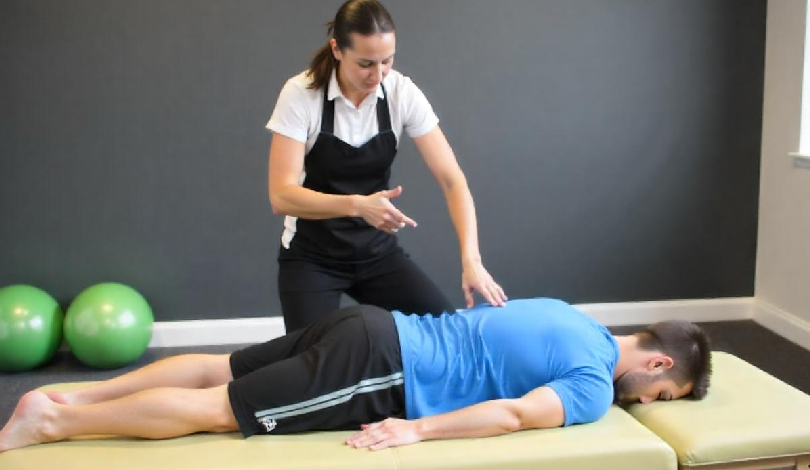Synopsis
Athletes constantly push their bodies to the limit, making them prone to spinal strain, muscle fatigue, and injuries. Whether you are a professional athlete or a fitness enthusiast, maintaining spinal health is crucial for peak performance and longevity. Sports and spine physiotherapy are vital in preventing injuries, improving posture, and enhancing mobility.
This blog explores how sports spinal physio rehabilitates sports-related injuries, ensuring long-term recovery and performance optimisation. We’ll also discuss how spinal cord physiotherapy helps restore mobility after serious injuries. For those looking for spine and sports physio, we highlight the benefits of expert-guided therapy sessions tailored to different athletic needs. Lastly, we’ll explain why seeking a spine specialist physiotherapist is key to safeguarding your spinal health and maintaining peak physical condition.
Table of Contents
- Introduction: Why Athletes Need Sports and Spine Physiotherapy
- The Role of Sports Spinal Physio in Injury Prevention
- How Spinal Cord Physiotherapy Aids Athletes in Recovery
- Key Techniques Used in Spine and Sports Physio
- Strengthening the Core for Better Spinal Stability
- Choosing the Right Spine Specialist Physiotherapist
- Orthocure Clinics: Leading the Way in Sports and Spine Rehabilitation
- Conclusion: Keep Moving, Stay Injury-Free with Physiotherapy
Introduction: Why Athletes Need Sports and Spine Physiotherapy
Sports demand agility, strength, and endurance—but they also put immense pressure on the spinal structure. Athletes engaged in high-impact sports such as running, weightlifting, and football are at a higher risk of developing spinal injuries. Spine misalignment, disc issues, and nerve compression are common problems that can hinder performance and cause long-term damage.
For athletes searching for sports and spinal physio, physiotherapy provides preventive and rehabilitative solutions to address these concerns. Strengthening the spinal muscles, improving posture, and optimising movement patterns can reduce the risk of injuries and enhance performance.
The Role of Sports Spinal Physio in Injury Prevention
Physiotherapy plays a key role in preventing injuries by:
- Strengthening Spinal Support: Improves muscle stability and reduces stress on the spine.
- Correcting Postural Imbalances: Prevents excessive strain on joints and ligaments.
- Enhancing Flexibility and Range of Motion: Promotes smooth movement and agility.
- Reducing Muscle Tension and Fatigue: Optimises recovery between workouts.
- Teaching Safe Movement Techniques: Minimises the chances of injuries during training.
With sports spinal physio, athletes can ensure that their spinal health remains strong, allowing them to perform at their best.
How Spinal Cord Physiotherapy Aids Athletes in Recovery
For athletes recovering from spinal cord injuries, spinal cord physiotherapy helps restore function and mobility through:
- Nerve Stimulation Therapy: Encourages neurological recovery.
- Strength-Building Exercises: Targets weakened muscle groups.
- Postural Training: Helps maintain spinal alignment during movement.
- Balance and Coordination Exercises: Improves overall mobility and movement control.
- Manual Therapy for Pain Relief: Reduces inflammation and nerve compression.
Athletes who have suffered spinal injuries can benefit greatly from spinal cord physiotherapy, ensuring they return to sports safely and effectively.
Key Techniques Used in Spine and Sports Physio
Spine and sports physio combines multiple physiotherapy techniques to enhance recovery and injury prevention:
- Manual Therapy: Loosens tight muscles and improves flexibility.
- Core Stabilisation Training: Strengthens muscles that support the spine.
- Dynamic Stretching and Mobility Exercises: Reduces stiffness and improves movement efficiency.
- Postural Analysis and Correction: Ensures proper spinal alignment.
- Strength Training for Spinal Muscles: Builds endurance and reduces fatigue.
These techniques are tailored to different sports and help athletes maintain peak performance while minimising injury risks.
Strengthening the Core for Better Spinal Stability
A strong core is essential for maintaining spinal health and preventing injuries. Sports spinal physio emphasises core strengthening exercises, including:
- Planks and Bridges: Strengthen lower back and abdominal muscles.
- Dynamic Core Movements: Improve agility and spinal control.
- Resistance Training: Enhances core endurance.
- Pilates-Based Stability Workouts: Increase flexibility and posture alignment.
Athletes looking for spine and sports physio can benefit significantly from a targeted core strengthening program.
Choosing the Right Spine Specialist Physiotherapist
A spine specialist physiotherapist provides expert guidance and personalised rehabilitation programs for athletes. The right specialist will:
- Conduct Detailed Assessments: Identify muscle imbalances and weaknesses.
- Design Sport-Specific Recovery Plans: Tailor treatments to individual needs.
- Provide Hands-On Therapy: Enhance mobility through targeted techniques.
- Guide Return-to-Sport Strategies: Ensure safe reintegration after injury.
Athletes must seek professional spine specialist physical therapy to maximise their recovery and prevent further complications.
Orthocure Clinics: Leading the Way in Sports and Spine Rehabilitation
At Orthocure Clinics, we specialise in sports and spine physiotherapy, offering expert-led rehabilitation and preventive care for athletes. Our spine specialist physiotherapists use MedX technology to assess spinal function and design custom treatment plans. Whether you need spinal cord physiotherapy, sports spinal physio, or general spinal rehabilitation, Orthocure provides scientifically backed solutions to keep you moving pain-free.
Conclusion: Keep Moving, Stay Injury-Free with Physiotherapy
Athletes must prioritise spinal health to maintain peak performance and longevity. Sports and spine physiotherapy ensure that injuries are prevented, movement is optimised, and recovery is accelerated. If you’re searching for a sports spinal physio or a spine specialist physiotherapist, Orthocure Clinics offers expert physiotherapy solutions tailored to your needs.
FAQs
How does sports and spine physiotherapy help athletes?
Sports and spine physiotherapy help athletes by improving flexibility, strengthening core muscles, and preventing injuries. It ensures spinal stability and enhances performance through targeted rehabilitation techniques.
What is the role of spinal cord physiotherapy in sports recovery?
Spinal cord physiotherapy is crucial in helping athletes regain movement, reduce nerve compression, and improve coordination. It focuses on strengthening weak muscles and restoring mobility after injuries.
Can physiotherapy help with chronic spinal pain in athletes?
Yes, physiotherapy helps manage chronic spinal pain using manual therapy, posture correction, and core strengthening exercises. It provides long-term relief without reliance on medication.
What are the benefits of working with a spine specialist physiotherapist?
A spine specialist physiotherapist offers personalised treatment plans, advanced therapy techniques, and expert injury prevention and rehabilitation guidance.
How often should athletes undergo spinal physiotherapy?
The frequency depends on individual needs, but regular physiotherapy sessions help maintain spinal health, prevent injuries, and optimise athletic performance.





